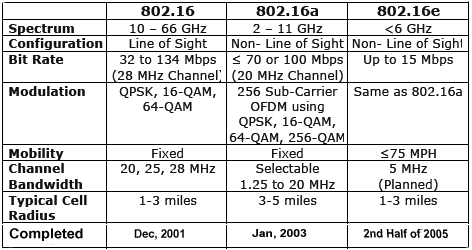
- WiMAX Tutorial
- WiMAX - Home
- WiMAX - Wireless Introduction
- WiMAX - What is WiMAX ?
- WiMAX & Wi-Fi Comparison
- WiMAX - Salient Features
- WiMAX - Building Blocks
- WiMAX - Reference Network Model
- WiMAX - Technology
- WiMAX - Physical Layer
- WiMAX - OFDM Basics
- WiMAX - MAC Layer
- WiMAX - Mobility Support
- WiMAX - Security Functions
- WiMAX - IEEE Standards
- WiMAX - WiMAXForum™
- WiMAX - Summary
- WiMAX Useful Resources
- WiMAX - Quick Guide
- WiMAX - Useful Acronyms
- WiMAX - Useful Resources
- WiMAX - Discussion
WiMAX - IEEE Standards
The IEEE 802.16, the Air Interface for Fixed Broadband Wireless Access Systems, also known as the IEEE WirelessMAN air interface, is an emerging suite of standards for fixed, portable and mobile BWA in MAN.
These standards are issued by IEEE 802.16 work group that originally covered the wireless local loop (WLL) technologies in the 10.66 GHz radio spectrum, which were later extended through amendment projects to include both licensed and unlicensed spectra from 2 to 11 GHz.
The WiMAX umbrella currently includes 802.16-2004 and 802.16e. 802.16-2004 utilizes OFDM to serve multiple users in a time division fashion in a sort of a round-robin technique, but done extremely quickly so that users have the perception that they are always transmitting/receiving. 802.16e utilizes OFDMA and can serve multiple users simultaneously by allocating sets of tones to each user.
Following is the chart of various IEEE 802.16 Standards related to WiMAX.

NOTE − The IEEE 802.16 standards for BWA provide the possibility for interoperability between equipment from different vendors, which is in contrast to the previous BWA industry, where proprietary products with high prices are dominant in the market.